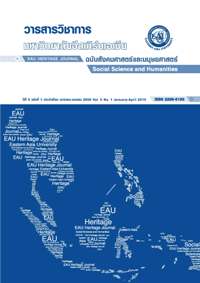ความผูกพันต่อองค์การของอาจารย์มหาวิทยาลัยภาครัฐในเขตกรุงเทพมหานคร
คำสำคัญ:
ความผูกพันต่อองค์การ, อาจารย์มหาวิทยาลัยรัฐ, กรุงเทพมหานคร, Organizational commitmentบทคัดย่อ
ของอาจารย์ผู้สอนมหาวิทยาลัยภาครัฐในเขตกรุงเทพมหานคร โดยใช้แบบสอบถามเก็บข้อมูลจาก กลุ่มตัวอย่าง ที่สุ่ม จาก 5 มหาวิทยาลัยได้แก่จุฬาลงกรณ์มหาวิทยาลัย มหาวิทยาลัยธรรมศาสตร์ มหาวิทยาลัยราชภัฎพระนคร มหาวิทยาลัยราชภัฎจันทรเกษม และมหาวิทยาลัยเทคโนโลยีราชมงคลพระนคร จำนวน 2,000 ชุด และเก็บข้อมูลเชิงคุณภาพจากผู้บริหารในระดับหัวหน้าสาขา หัวหน้าภาควิชา รองคณบดี หรือคณบดีจากมหาวิทยาลัยที่เป็น กลุ่มตัวอย่างทั้งหมด 30 คน ผลการศึกษา พบว่า อาจารย์มหาวิทยาลัยภาครัฐให้ความสำคัญกับบรรยากาศเชิง จริยธรรม ซึ่งมีความสัมพันธ์กับความผูกพันต่อองค์การมากที่สุด โดยค่าสัมประสิทธิ์สหสัมพันธ์เพียร์สันของอายุ และรายได้ของอาจารย์กับความผูกพันต่อองค์การพบว่า ไม่มีความสัมพันธ์กัน แบบผู้นำเน้นงานกับความผูกพัน ต่อองค์การ พบว่าสหสัมพันธ์ระหว่างบรรยากาศเชิงจริยธรรมกับความผูกพันต่อองค์การมีมาก รองลงมา คือ ความพึงพอใจในงาน แบบของผู้นำเน้นงาน และสภาพจิตตามลำดับมีสหสัมพันธ์กับความผูกพันต่อองค์การ ในระดับปานกลางเช่นกัน ดังนั้นจึงเป็นสิ่งที่ท้าทายให้ผู้วิจัยได้ศึกษาบรรยากาศเชิงจริยธรรมในฐานะที่เป็นตัวแปร สำคัญในการส่งเสริมความผูกพันต่อองค์การในการวิจัยในอนาคตเพื่อเป็นการต่อยอดองค์ความรู้ในด้านปัจจัย ที่สำคัญของบรรยากาศเชิงจริยธรรมว่าอะไรคือปัจจัยสำคัญต่อความผูกพันต่อองค์การ
Organizational Commitment of Public University Teachers in Bangkok Metropolitan Area
The purpose of this study was to examine the relationship between teacher age income, initiating structure leadership style, facet of job satisfaction, ethical climate, psychological well-being and organizational commitment of public teachers in Bangkok Metropolitan area. Six hypothesis were used in the quantitative research. The hypothesis consisted of the relationship between teacher age, teacher income, the initiating structure leadership styles the facet of job satisfaction, the ethical climate, the psychological well-being and organizational commitment. This dissertation use the questionnaires as follow: (a) personal factors (b) leadership style scales developed by House and Dessler (1974) (c) facet of job satisfaction scales developed by Cellucci and Devries (1978) (d) psychological well-being scales developed by Ryff (f) ethical climate likert scale by Victor and Cullen and (e) organizational commitment scale by Mowday, Steer and Porter. The respondents of this study were the teachers of public university in Bangkok Metropolitan area which random from five universities sampling such as Chulalonkorn university, Thammasart university, Rajapat Pranakorn university Rajapat Chantrakasem university and Rajmankala Pranakorn Technological university that the researcher send 1,784 to respondents; 1,700 were returned and completed. The Pearson correlation coefficients of between teacher age, income and organizational commitment, there are no relationship with significance at the 0.01 level, initiating structure leadership style and organizational commitment were 0.512, facet of job satisfaction and organizational commitment were 0.546, ethical climate and organizational commitment were 0.628, psychological well-being and organizational commitment were 0.497 that there were positive relationship with significance at the 0.01 level. In summary, the pearson correlation between ethical climate and organizational commitment is highly positive relationship, follow to mediate relationship on facet of job satisfaction, initiating leadership style and psychological well-being orderly. In addition to build the qualitative questionnaire to ask for management such as head of sub-division, head of department, sub dean and dean that random sampling from thirty samples for fulfill in this study. The results on this empirical study founded that many teachers of public university mostly rated on ethical climate that highly correlation with organizational commitment. So this is the challenging for researchers to study ethical climate as to the key variables to promote organizational commitment for future research to serve the body of knowledge of what are the key factors of ethical climate contribute to organizational commitment.





